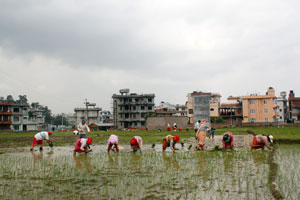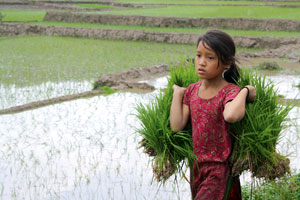 PICS: ANURAG ACHARYA |
Dharmalal Maharjan, 47 has taken a week off from his air-conditioned office in Nepal Telecom. But he is not going on a vacation. Instead, the tech-savvy executive has been toiling all day in the field in Dhapakhel, Lalitpur, barely 10 km from his office. "Every year I take a leave from my office during the monsoon to plant rice paddy," says the sixth grade assistant engineer who was supervising more than a dozen men and women in the field.
Maharjan's son is a civil engineer and daughter-in-law is an architect. The entire family is technician by profession, "but I am a farmer's son", he told Nepali Times proudly. At a time when land prices have skyrocketed in the area and many are selling their lands to builders, Maharjan is not willing to let go of his rural roots.
"I get to eat what I grow with my own hands. It's healthy and gives me immense satisfaction," says the farmer whose one hectare land is among the few green patches in a sea of concrete structures.
Today, Dhapakhel is one of the fastest growing residential areas in the Valley. The expansion of the city beyond Ring Road has changed the landscape dramatically with blacktopped road networks running through plots of farmlands, giving it a semi-urban look. But many residents are uncomfortable with the speed of urbanisation.
 |
The high productivity of Dhapakhel's soil can provide farmers with healthy yield. After investing around Rs 80,000, Maharjan managed to harvest 7,000 kg of rice last year which earned him a profit of Rs 200,000. "I hope the prices don't fall this year," he chuckles as he invites us to visit his wife's dairy farm which supplements their farm earnings.
But the return on investment is not encouraging enough for small farmers like Dongol to sustain themselves only through agriculture. Lack of farm help, expensive fertilisers and machineries, coupled with real estate agents and brick kiln owners willing to pay premium price, mean that only those who want to keep their family legacy alive are holding on to their lands. Says Dongol: "It's our love for farming and our attachment with this land that keeps us going."


